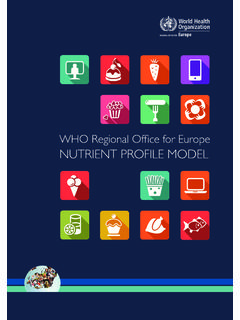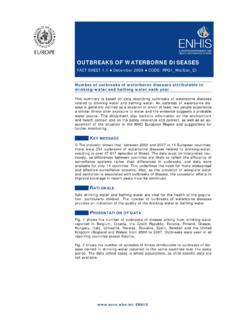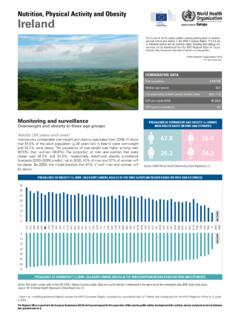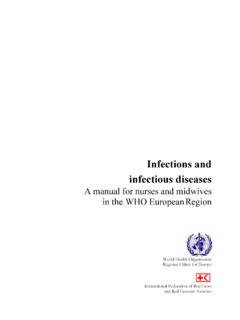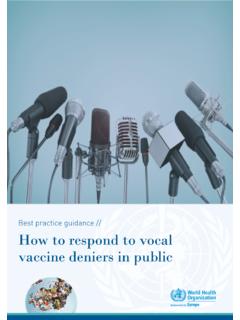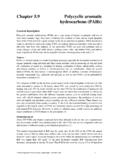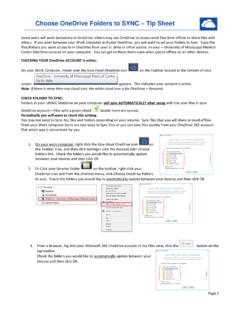Transcription of If you choose not to vaccinate your child, understand the ...
1 Information for parents1 If you choose not to vaccinate your child, understand the risks and responsibilitiesWith the decision to delay or refuse vaccines, you are taking on an important responsibility that could put your child s health and even life into riskAny time that your child is ill and you: make an emergency call; ride in an ambulance; visit a hospital emergency room; or visit your child s doctor or any clinicyou must tell the medical staff that your child has not received all the vaccines recommended for his or her age. Keep a vaccination record easily accessible so that you can report exactly which vaccines your child has received, even when you are under healthcare professionals your child s vaccination status is essential for two reasons When your child is being evaluated, the doctor will need to consider the possibility that your child has a vaccine-preventable disease, such as measles, mumps, pertussis or diptheria.
2 These diseases still occur, and the doctor will need to consider that your child may have one. If your child has a vaccine-preventable disease, the healthcare workers who help your child can take precautions, such as isolating your child, so that the disease does not spread to people are at higher risk of infectionOne group at high risk for contracting disease is in-fants who are too young to be vaccinated. For example, the measles vaccine is not usually recommended for babies younger than 9-12 months. Very young babies who get measles are likely to be seriously ill, often requiring people at high risk of contracting disease are those with weaker immune systems, due to other existing diseases or medications they are taking (such as some people with cancer, autoimmune diseases or transplant recipients).
3 If you choose to delay some vaccines or refuse some vaccines entirely, there can be risks. Please follow these steps to protect your child, your family, and others. WHO / M. BringInformation for parents2 Before an outbreak of a vaccine-preventable disease occurs in your community Ensure that your child is adequately immunized forhis or her age according to the routine immunizationschedule. Talk to your child s doctor or nurse to be sure yourchild s medical and immunization records are up todate regarding vaccination status. Ask for a copy of theupdated record.
4 Keep your child s school, childcare facility and othercaregivers updated on your child s vaccination status. Be aware that unimmunized children can catchdiseases from people who don t have any cannot tell who is depend on high immunization coverage to keep vaccine-preventable diseases from spreading. The more parents who choose not to vaccinate their children, the greater the risk of spreading diseases. When there is vaccine-preventable disease in your community It may not be too late to get protection by getting vaccinated. Ask your child s doctor.
5 If there are cases (or, in some circumstances, a single case) of a vaccine-preventable disease in your community, you may be asked to take your child out of school, childcare or organized activities (for example, playgroups or sports). your school, childcare facility or other institution will tell you when it is safe for an unvaccinated child to re-turn. Be prepared to keep your child home for several days or up to several weeks. Learn about the disease and how it is spread. It may not be possible to avoid exposure. Each disease is different, and the time between when your child might have been exposed to a disease and when he or she may get sick will vary.
6 Talk with your child s doctor to get their guidelines for determining when your child is no longer at risk of coming down with the put not only your child but also your community at risk when you decide not to WARE- Any vaccine-preventable disease can appear at any time in the European Region because all of these diseases still circulate either here or elsewhere in the Sometimes vaccine-preventable diseases cause clusters of cases and outbreaks, an increased number of cases in a given time and For some diseases, one case is enough to cause concern in a community.
7 An example is measles, which is one of the most contagious diseases known. This disease spreads quickly among people who are not In most cases, there is no way to know beforehand how severe diseases will be in your child. Learn more by asking your health care provider for the sheet titled Vaccine-preventable diseases: signs, symptoms & complications Information for parents3 World Health Organization 2012 If you know your child is exposed to a vaccine-preventable disease for which he or she has not been vaccinated Learn the early signs and symptoms of the disease.
8 Seek immediate medical help if your child or anyfamily members develop early signs or symptoms ofthe you travel with your child Review the WHO travellers information website ( ) before travelling to learn about possible disease risks and vaccines that will protect your family. Diseases that vaccines prevent remain common throughout the world. If you are aware that you or your child have a vaccine-preventable disease, do not spread disease to others. Do not travel in such condition, as you or other family members could still be infectious.
9 If an unimmunized person develops a vaccine-preventable disease while travelling, to prevent transmission to others, he or she should not travel by a plane, train or bus until a doctor determines the person is no longer contagious. In certain instances, public health authorities may prevent you from travelling , due to the risk of disease your own status Make sure to check your own immunization status, as you are putting your child at risk of disease when you are not fully vaccinated. Follow recommendations to isolate your child from others, including family members, and especially in-fants and people with weakened immune systems.
10 Be aware that for some vaccine-preventable diseas-es, there are medicines to treat infected people and medicines to keep people they come in contact with from getting the disease. Ask your healthcare provider about other ways to protect your family members and anyone else who may come into contact with your child. your family may be contacted by the state or local health department that tracks infectious disease out-breaks in the : Notify your doctor, local medical facility, ambulance or emergency room personnel that your child has not been fully vaccinated before medical staff have contact with your child or your family members.

